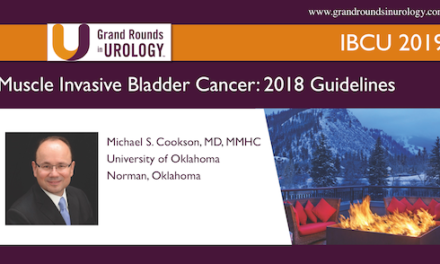Sam S. Chang, MD, MBA, presented “Controversies in NMIBC: Guidelines and Beyond” at the 6th International Bladder Cancer Update on November 19, 2022, in Scottsdale, Arizona.
How to cite: Chang, Sam S. “Controversies in NMIBC: Guidelines and Beyond” November 2022. Accessed Apr 2024. https://grandroundsinurology.com/controversies-in-nmibc-guidelines-and-beyond-2023/
Controversies in NMIBC: Guidelines and Beyond – Summary
Sam S. Chang, MD, MBA, the Patricia and Rodes Hart Endowed Professor of Urologic Surgery and Oncology and the Oncology Fellowship Director and Vice Chair of Urologic Surgery at Vanderbilt University Medical Center in Nashville, Tennessee discusses guidelines related to non-muscle invasive bladder cancer (NMIBC). He outlines the goals and purpose of the American Urological Association (AUA) NMIBC guidelines and how they provide a risk-stratified clinical framework for the management of NMIBC. Dr. Chang outlines the goals of therapy, emphasizing both the importance of appropriate, aggressive therapy for high-risk tumors, but also of reduced therapy and management for low-risk patients to avoid overtreatment. He addresses the Bacillus Calmette-Guérin (BCG) shortage, which will likely persist for several years. Dr. Chang cites updates to American Urological Association (AUA)/Society of Urologic Oncology (SUO) guidelines for NMIBC, as well as European Association of Urology (EAU) guidelines and National Comprehensive Cancer Network (NCCN) guidelines, explaining some of the nuances. While there are many guidelines with different methodologies, there is not much controversy over management strategies for NMIBC patients. He discusses guidelines recommending the use of blue light cystoscopy (BLC) to increase detection and decrease recurrence and addresses controversy due to a study, suggesting BLC does not improve the three-year recurrence-free rate. Dr. Chang concludes that BLC is preferred as the best way to optimize tumor resection and tumor identification. He turns to the AUA Risk Stratification Table and explains data that show risk-stratification does work and helps individualize care. Dr. Chang shares a risk-stratification tool endorsed by AUA that allows clinicians and patients to easily see if there is a relevant clinical trial available to them. He then shares EAU guidelines, pointing out these have split high-risk patients into high-risk and very-high-risk categories. Dr. Chang addresses recent controversy regarding the intermediate-risk category and efforts to further break out that category in ways that are helpful to clinicians. He then states that groups have similar treatment recommendations, but show them in different ways, such as the NCCN guidelines that are most often referenced by oncologists, as well as an iterative AUA guideline algorithm. A high-risk case study shows the guidelines are in close agreement as far as treatment (BCG), but not in agreement when alternatives to BCG are needed, as there is no standard or clear regimen that is recommended. Dr. Chang addresses options, including a combination chemotherapy with gemcitabine and docetaxel for BCG-naive patients and treatment with intravesical chemohyperthermia with mitomycin C (CHT), citing a dearth of research data available for chemohyperthermia. He addresses cystectomy, emphasizing that it is curative, as well as variant histology, referencing an update to AUA guidelines. Dr. Chang addresses treatment options for BCG-unresponsive NMIBC. In conclusion, Dr. Chang highlights the ongoing BCG shortage and its effect on treatment choices, but explains that FDA-approved systemic therapy is currently available for BCG-unresponsive disease, improvements in treatment and risk-stratification continue, risk-stratification continues to determine therapy and surveillance strategies, intravesical and/or systemic therapies are being studied and need enrollment support, and future improvements in tumor resection and predictive and prognostic biomarkers continue to develop. He emphasizes that all of this makes this an exciting time for cancer research.
About the 6th International Bladder Cancer Update:
The International Bladder Cancer Update (IBCU) is a CME conference focused on the diagnosis and treatment of bladder cancer. The conference offers medical professionals an opportunity to listen to updates from, and interact with, expert international faculty to improve knowledge and determine best treatment practices to improve patient outcomes. IBCU encompasses expert lectures, interactive discussions, a panel roundtable, debates, and case presentations. It is physician-led, multi-supported, and designed for urologists, urologic oncologists, and other healthcare professionals involved in the treatment of bladder cancer.
For further educational activities from this conference, visit our collection page.




